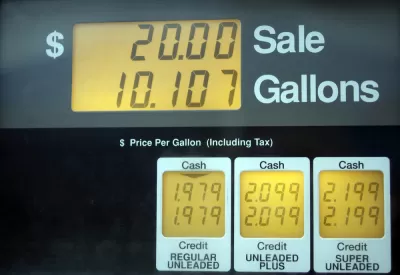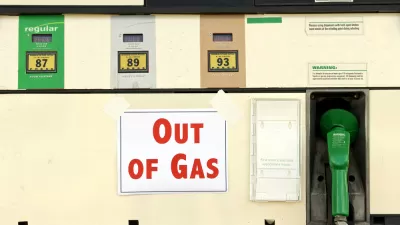A movement at the state and federal levels would take advantage of low oil prices to boost gas taxes to pay for infrastructure. Michigan, Iowa, and Utah proposals, and a change to the federal Corker-Murphy plan, are described below.

As a general rule, politicians are loath to touch gas taxes—unless to lower or eliminate them. "But the sharp drop in gasoline prices—to less than $2 a gallon at more than a third of U.S. stations—is brightening consumers’ moods, potentially taking the edge off raising state taxes," writes Josh Mitchell who covers the U.S. economy from The Wall Street Journal's Washington, D.C. bureau.
On the state level, Mitchell writes about developments in three states with Republican governors:
- "In Michigan, the GOP-controlled legislature approved a plan last month for a ballot initiative to boost the gas tax for road repairs [sic]."
- As we noted last month, the ballot measure asks voters to raise the general sales tax - exempting motor vehicle fuel. However, Jonathan Oostin of MLive indicates that if voters approve the May sales tax measure, it would trigger changes to the gas tax that would essentially do what Gov. Rick Snyder had proposed in November:
- "Convert existing 19-cent per gallon gasoline and 15-cent per gallon diesel taxes to a wholesale version. Gas taxes could top 41 cents by October 2015, but there would be no additional sales tax, and all resulting revenue would go to transportation." [State gas taxes total 30.26 cents per gallon as of Jan 1 according to API (PDF)].
- "In Iowa, Republican Gov. Terry Branstad is gauging lawmakers’ support for the first state gas-tax increase since 1989, among other options to raise transportation funds."
In June, 2013, we noted that Branstad ruled out gas tax increases amidst a "Midwest gasoline price spike" ($4.47 per gallon in Chicago). According to the Jan. 9 AAA Daily Fuel Gauge Report, the average price in Iowa was $1.99 gallon.
William Petroski of The Des Moines Register writes that Branstad not only wants the votes to determine whether to increase the gas tax, but to have county by county referendums on "1 percent local option sales tax on gasoline and diesel fuel"
- In Utah, Republican leaders in the state House signaled this week they are moving to raise the gas tax to cover a transportation-funding shortfall.
- Lee Davidson of The Salt Lake City Tribune writes that legislators are proposing "not only to increase (the) gasoline tax — maybe by 10 cents a gallon — but also to restructure it so that it could automatically adjust once a year to keep pace with inflation." In addition, as we've seen elsewhere, legislation will include electric vehicle fees in the form of increased registration fees to compensate for not paying gas taxes.
Three states already have taken advantages of falling gas prices. Having approved gas taxes earlier that took effect Jan 1, motorists in Virginia, Pennsylvania, and Maryland saw gas prices decline as falling global oil prices swallowed the tax increases, reports AASHTO Journal.
Similarly, California's carbon charge, estimated at 10-cents per gallon by the California Air Resources Board (CARB), arrived largely unnoticed on Jan. 1.
Mitchell writes about many developments on the federal level, one of the most interesting being a changed proposed by one of the co-authors of the only Senate tax increase measure currently under consideration—as a proposal, not as legislation.
To circumvent a backlash, Mr. Corker [R-Tenn.] is working with Democrats to couple a gas-tax increase with an income-tax break for the lowest earners. Instead of a standalone bill, the plan would be inserted into a broad package of legislation this year, such as one aimed at overhauling corporate taxes, Mr. Corker said.
Interestingly, this is exactly what was listed in the "Five Gas Tax Myths" post as a way to deal with the objection that gas taxes are regressive and hurt the poor. It may have been instrumental in getting the 4.3-cents gas tax increase passed in 1993, the last time the federal gas tax was raised.
Correspondent's note: Article appeared on page A2 of Friday's (Jan. 09) Wall Street Journal. The link should provide a "free pass".
FULL STORY: In low gasoline prices, an opening emerges for higher taxes

Study: Maui’s Plan to Convert Vacation Rentals to Long-Term Housing Could Cause Nearly $1 Billion Economic Loss
The plan would reduce visitor accommodation by 25,% resulting in 1,900 jobs lost.

North Texas Transit Leaders Tout Benefits of TOD for Growing Region
At a summit focused on transit-oriented development, policymakers discussed how North Texas’ expanded light rail system can serve as a tool for economic growth.

Why Should We Subsidize Public Transportation?
Many public transit agencies face financial stress due to rising costs, declining fare revenue, and declining subsidies. Transit advocates must provide a strong business case for increasing public transit funding.

A Visual Celebration of Manhattan’s Chinatown Elder Community, Through Food
Lanterns, cafeteria trays, and community connection take center stage in this stunning photo essay.

How to Make US Trains Faster
Changes to boarding platforms and a switch to electric trains could improve U.S. passenger rail service without the added cost of high-speed rail.

Columbia’s Revitalized ‘Loop’ Is a Hub for Local Entrepreneurs
A focus on small businesses is helping a commercial corridor in Columbia, Missouri thrive.
Urban Design for Planners 1: Software Tools
This six-course series explores essential urban design concepts using open source software and equips planners with the tools they need to participate fully in the urban design process.
Planning for Universal Design
Learn the tools for implementing Universal Design in planning regulations.
City of Santa Clarita
Ascent Environmental
Institute for Housing and Urban Development Studies (IHS)
City of Grandview
Harvard GSD Executive Education
Toledo-Lucas County Plan Commissions
Salt Lake City
NYU Wagner Graduate School of Public Service



























